Newsletter


Our Newsletter
Connections
Mar
1
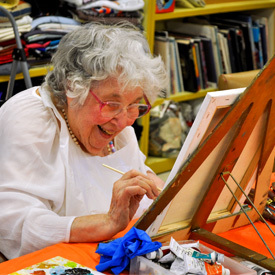
The Art of Making Crafts at Los Angeles Jewish Health
Arlene Bercu
Los Angeles Jewish Health is renowned for advancing the health of older adults across our
community. Its commitment to raising the bar on compassionate, high-quality care
includes a dedicated focus on emotional wellness—engaging seniors in creative,
stimulating activities that help them find enjoyment in every day. Los Angeles
Jewish Health's Arts and Crafts Program is a prime example, bringing people
together to give life to new ideas and make memories along the way.
The
Arts and Crafts Room is a bustling hub of energy at Los Angeles Jewish Health,
offering residents resources, guidance, and camaraderie as they develop their
creative talents and produce a wide range of beautiful handcrafts. "It's where
we host instructors for oil-based painting classes, and where we teach knitting,
quilting, crocheting, and all the various needlecrafts," says Annette Weinberg,
Los Angeles Jewish Health's campus lifestyle and enrichment director for
Eisenberg Village. "The studio is packed full of every possible supply material
for any project a resident would like to do."
Staffed by Arts and Crafts
Director Radka Falk, the Arts and Crafts Room enables residents to express
themselves while achieving a state of emotional Zen. "Creativity is soothing for
the soul, and this is such an uplifting environment," Annette says. "People
often spend hours here, and their tasks take them away to a whole other place."
Norma Garber
Norma Garber, 89, is one of those people, a lifelong seamstress who trained
as a young girl in England to be a high-end dressmaker. She volunteered at Los
Angeles Jewish Health before becoming a resident about four and a half years ago
and notes that, even then, she knew the Arts and Crafts Room would be where she
would spend much of her time once she moved in.
"I like quilting and
making pillows, challah covers, and table runners. I love everything I do here;
I call it my ‘happy room,'" Norma laughs. "Radka is amazing—there isn't
anything she doesn't know how to do. And I get to spend time with my friends,
like Casey Joseph, another quilter."
Toby and Clara Silnik
Casey, 89, enjoys the shared sense
of purpose the Arts and Crafts Room inspires. "Spending time with Norma is
great: It's nice to have someone to talk to who understands what you're trying
to do and can help you map it out," she says. "I love the creativity and beauty
of using my hands to make something. The idea that one of my quilts is keeping a
baby, a child, or an adult cozy, just warms my heart."
In addition to
nurturing residents' creative impulse, the Arts and Crafts Room also welcomes
visitors interested in viewing—and even purchasing—some of the goods made on
the premises. A gallery of canvases painted by residents is on permanent
display, and a small, on-site store offers a number of resident-made items for
sale.
Director Radka Falk
"The money we make from the shop gets reinvested into the gift
shop so we can continue buying supplies for residents to craft with!" Annette
says.
Frequenters of the Arts and Crafts Room are often joined by Los
Angeles Jewish Health volunteers, who bring a variety of craft projects with
them for residents to complete.
"The items you can find in the shop are
just gorgeous. But, even more importantly, making those items does absolute
wonders for our residents' well-being," Annette says. "When they're here, their
spirits soar."
Jan
31
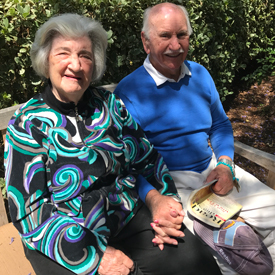
Under the Jacaranda Tree: A Story of Love
By Glenda Hahn
Many lasting and loving relationships are formed at Los Angeles Jewish Health. During this season of love, we want to share this very special and touching story written by Glenda Hahn, the daughter of Mary Freeman.
My mom, Mary, came from a marriage that offered little by way of love or affection.
We were led to believe my parents stayed together for the stability of their children.
When my father passed away in 1995, my mom felt like a bird let out of a cage.
This was her opportunity to spread her wings and follow her dreams to emigrate from
her native South Africa to join me and my family in the United States. My kind and
generous husband offered her employment, and thus an avenue to support herself.
Mary was independent, caught buses to wherever she wanted to go, made new friends,
and created a great and happy life for herself.
When Mom eventually needed more assistance with daily living, we were fortunate
to find an excellent facility for her: Los Angeles Jewish Health, formerly the Los
Angeles Jewish Home. The slight resistance she initially gave us quickly dissipated
when she realized this was a place for her to enjoy playing cards and bingo, learn
the computer, and enjoy movies and other activities. She was social, made new friends,
and soon realized she had come to the right place.
I’m not sure how Mary and Cyril first connected, but it could have been in discussion
of the beautiful jacaranda tree that sat in the gardens of Eisenberg Village, located
on one of the Los Angeles Jewish Health campuses. Coincidentally, Cy was also from
South Africa, and the tree brought back memories for both of them of the beautiful
trees, with their magnetic purple blooms, lining the streets of Johannesburg and
Pretoria. The shade of this beautiful tree would later become their meeting place—a
spot where they would sit, hand-in-hand, admiring the blossoms and reminiscing about
life in the "old country." It was the start of a love story between two
nonagenarian expats from South Africa.
Not only did the twosome discover they were from the same country; they came
from small cities in close proximity to each other. In fact, Mary’s husband had
gone to Cyril’s high school! Now, many decades later, they were sitting cuddled
up in a place over 10,000 miles away.
Mary and Cy (as he was called) became known to the residents of Los Angeles Jewish
Health as "a couple." They would spend their days in the Newman Lounge
watching TV, or in front of the Newman building, where more often than not, at least
one of them would doze off. They would reminisce about life in South Africa, talk
about their children, and quote excerpts from Hamlet, which they had both studied
in high school.
After some time, it became clear Mary required more care. The decision to move
her to skilled nursing was a difficult one because separating her from her beau
would be hard on both of them. Yet, the separation only brought them closer. With
the exception of mealtime, Cy spent nearly every waking moment trekking over to
the Max Factor Building to be with Mary.
It seemed nothing was going to keep these two apart…until COVID hit. Quarantine
meant they would no longer be able to spend time together. For nearly eight months,
they were separated by the virus. Would their relationship be able to weather this
storm?
When the pandemic began to wane, Mary, whose memory and cognition had deteriorated,
moved to the Goldenberg-Ziman Special Care Center. As it happened, Cy was also suffering
from the early stages of dementia – and he, too, moved to the G-Z Building.
American poet Maya Angelou wrote, "Love recognizes no barriers. It jumps
hurdles, leaps fences, penetrates walls to arrive at its destination full of hope."
Suddenly, the duo were together again, and the connection was still there. Both
were hard of hearing, which made verbal communication difficult, but they had each
other, their memories, and their mutual longing for South Africa and its beautiful
jacaranda trees.
Mary passed away several months ago. This spring, as the jacaranda at Los Angeles
Jewish Health begins to bloom, I’ll think with gratitude of my mother, and of Cy,
and of the wonderful time they spent together.
Jan
31
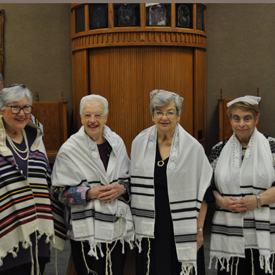
At Los Angeles Jewish Health, B'not Mitzvah to Remember
Judith Karon, Casey Joseph, Marcia Mass and Sue Solender with Rabbi Ron Goldberg
The great dramatist and author George Bernard Shaw famously declared that "Youth
is wasted on the young." But Shaw clearly never met the residents of Los Angeles
Jewish Health, whose incredible energy, dynamism, and desire to learn prove it's
always a good time to engage in a journey of self-discovery.
Last month, four Los Angeles Jewish Health residents celebrated their b'not mitzvah.
In a ceremony typically celebrated by 12 or 13 year olds, the 4 women stood in front
of their community at Eisenberg Village to read from the Torah and offer their interpretations
of its text, in the process honoring the faith of their forebearers and affirming
their commitment to Jewish peoplehood.
For Casey Joseph, Judith Karon, Marcia Mass and Sue Solender, deciding to study
for an adult bat mitzvah required a leap of faith on multiple levels.
"Whether you're a teenager or a woman somewhat past that, it takes a lot of courage
to stand up in front of family and friends and chant words in an unfamiliar language,
becoming links in a chain that extends all the way back to Mt. Sinai," says Rabbi
Ron Goldberg, rabbi of Los Angeles Jewish Health's Eisenberg Village campus. "I
am just thrilled for these women, whose determination and hard work were on display
for everyone to see."
Rabbi Goldberg officiated at the ceremony, the outgrowth of an adult b'nai mitzvah
program he put together with Chief Mission Officer for Los Angeles Jewish Health
Rabbi Karen Bender. He says most female residents of Los Angeles Jewish Health never
had the opportunity to read from the Torah as young adults—and that he and Rabbi
Bender are thrilled to help them engage with Jewish liturgy and tradition.
"Today our female residents—who as girls may have been denied a chance to do
what their male counterparts were doing—get to stand up and speak for themselves,"
Rabbi Goldberg says.
Marcia Mass with President-CEO Dale Surowitz
Making her own decisions about what she could do was particularly important to
Casey Joseph, 69, a native of Pittsburgh who moved to Los Angeles with her family
when she was 11. "I was always interested in learning about Judaism, but I was always
told ‘no' because it was something reserved for boys," she says. "I never stopped
thinking about it and knew it would be important for me to do at some point. Being
at Los Angeles Jewish Health, I realized now was my moment, and I reached out and
grabbed it."
Sue Solender, 80, felt similarly. "When I was in grade school, the Jewish community
in my hometown of Minneapolis built a Hebrew school, and I wanted to go, but my
mother told me I couldn't," she says. "So, I waited and waited, and once I arrived
at Los Angeles Jewish Health, I decided that, if they ever had an adult bat mitzvah
study group, that would be a sign."
For Marcia Mass, 81, the bat mitzvah
was a chance to connect with her roots. "My parents moved out to Los Angeles to
get away from the orthodoxy of my father's family, so they were not religious, and
we never did anything special to mark the holidays," she recalls. "When I had my
own daughters, I decided it was important for them to be raised as Jews and to learn
about their culture, and both of them had bat mitzvahs."
Yet, Marcia never fully explored her own Judaism, and Los Angeles Jewish Health
opened her up to the possibility. "I studied hard, and I'm so thrilled it came together
and that I was able to share it with three other strong women," she says. "It was
a marvelous experience."
Casey Joseph with Chairman Andrew Berman
This was the second adult bat mitzvah for
Judith Karon, 83. In 1995, she studied with her rabbi in Duluth, Minnesota, and
took advantage of the bat mitzvah event as an occasion to have a family reunion.
"People came from all over the country, and I did the whole thing: Torah reading,
haftorah, big party with music. It was special. But this time, at Los Angeles Jewish
Health, it was much more spiritually significant to me," Judith says.
"Part of what was so wonderful was that the four of us developed a closeness
as we learned and prepared together," she continues. "Also, when I got up in front
of the congregation, I saw the place was packed, and I was just blown away. All
of our friends were there, and our fellow residents, and the staff, and even the
chairman of the board of directors and the CEO."
During the ceremony, Los Angeles Jewish Health CEO and President Dale Surowitz
presented the b'not mitzvah with Kiddush cups; Andrew Berman, chairman of Los Angeles
Jewish Health's board, handed out commemorative certificates to mark the occasion.
Their presence was just one of the many things that made the warmth and excitement
in the room that day palpable, Judith says. "There was just this incredible sense
of community. You really had to be there to experience it!"
Jan
31
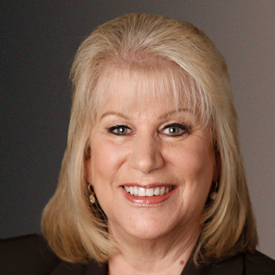
Susie Fishenfeld Named Vice President of Brandman Centers for Senior Care
Following nearly a decade of dedicated service at Los Angeles Jewish Health,
Susie Fishenfeld has been promoted to the role of vice president of the Brandman
Centers for Senior Care (BCSC), a Program of All-inclusive Care for the Elderly.
Fishenfeld, who has more than 35 years of experience in healthcare administration,
began her tenure at BCSC in November 2014.
In her role, Fishenfeld is responsible for corporate program operations, regulatory
compliance, fiscal management, quality improvement, patient and family satisfaction,
strategic planning, and program development and expansion.
In commenting on the promotion, Larissa Stepanians, chief operations officer
for Los Angeles Jewish Health, shared, "Susie is richly deserving of this promotion.
She is widely recognized in the field of senior care for her energy, enthusiasm,
and can-do spirit. Under her leadership, the participant census of our PACE program
continues to grow, providing even more seniors in the San Fernando Valley with our
award-winning senior care. Even throughout the COVID-19 pandemic, Susie ensured
our Center stayed open to care for those who needed a safe place to go and receive
services. Thanks to her dedicated service, we continue to grow, and, in fact, we
plan to open a new Brandman Centers for Senior Care location on Pico Blvd., on LA’s
Westside, this summer."
Prior to coming to Los Angeles Jewish Health, Fishenfeld served 17 years as senior
general manager for Vitas Healthcare Corporation, Vitas Innovative Hospice Care.
Before Vitas, Fishenfeld had a 13-year tenure at Encino-Tarzana Regional Medical
Center, where for her last five years she served as vice president of patient care
services.
Fishenfeld completed her undergraduate education at the University of California,
Berkeley, and received a bachelor of science in nursing from the University of California,
San Francisco. She holds a master’s degree in nursing from California State University,
Long Beach in Administration and as a critical care clinical nurse specialist.
Fishenfeld has been involved with many professional organizations throughout
the state of California, most recently, CalPACE where she is a member on the board
and prior officer serving as secretary. Holding
prior committee positions include both the California Hospice and Palliative Care
Association and the California Association for Health Services at Home. She
has also served on the executive committee for the Leukemia and Lymphoma Association.
Fishenfeld resides in the city of Calabasas with her husband Moe. She has two
children and four grandchildren.
Jan
4
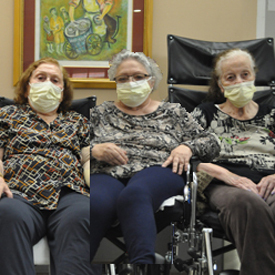
The Three Musketeers of Los Angeles Jewish Health
When Talat Barahmand, Iran Diansedgh, and Zaghi Kohan Ghadosh moved into Los
Angeles Jewish Health, they expected to find vital assistance in meeting their daily
critical care needs. What they did not expect was to find fast friendships that
would ease their transition to a new living situation and fill their days with joy.
The three women arrived at Los Angles Jewish Health not knowing one another:
Iran about six years ago, Talat around five years ago, and Zaghi, most recently,
approximately, three years ago. Sharing a common background (all are originally
from Iran) and a common language (Farsi), they quickly connected and have been inseparable
ever since.
Iran and Zaghi are roommates in the Mark Taper building; Talat lives across the
hall. Rabbi Karen Bender, chief mission officer at LA Jewish Health, refers to the
friends as "the Three Musketeers."
"They spend as much time together as possible, and it's just amazing,"
she says. "What a gift they have received and given to each other by finding
best friends at this stage of life!"
Iran, 100, is a native of Teheran; she and her husband fled after the Islamic
Revolution. They landed in Dallas, Texas, where they had a daughter, son-in-law,
and grandchildren, and spent roughly 15 years living there before making their way
to Southern California, home to their other two children. Her husband passed away
in 2007, and she lived on her own until her health and advancing age made independent
living impossible.
As Iran tells it, her experience at Los Angeles Jewish Health has been excellent
– the people and the service have all been wonderful. She is especially grateful
to be able to spend her days alongside Zaghi and Talat.
"We do everything together: playing bingo, attending Shabbat services, listening
to music," she says. "We're all really happy."
Of course, there are occasional disagreements; all three women prefer to see
themselves as being in the right. "We may argue, but there are no actual fights!"
Iran laughs.
Zaghi, 90, has been in the United States for two decades. She came from the Iranian
city of Shiraz, which she fled because of the increasing intolerance of the authoritarian
government. In Iran, Zaghi's family was quite wealthy, but during the revolution
they lost everything: their home, the two cinemas they owned, and extensive property
holdings.
Los Angeles made sense as a destination because two of her five children lived
here. It was difficult to adapt to an unknown environment, but with her family's
support she built a new life. "I miss Iran, but I like California," she
says.
When mobility issues made it clear she could no longer live without assistance,
she moved into Los Angeles Jewish Health and was thrilled to meet people with similar
backgrounds. "My friends are the best, and I love talking with them,"
she says. "We chat, we watch Persian TV, and sometimes, as Iran pointed out,
we argue. But we always stay close."
At 86, Talat is the youngest of the group. She and her husband, along with one
of their three daughters, emigrated from Iran in 1996 as a result of religious persecution,
making their way to Los Angeles, where their other daughters and their son already
lived. It was a difficult move, but they were thrilled to be reunited with family
and away from a repressive regime.
After Talat's husband died in 2011, her deteriorating vision made living alone
a health hazard, and she chose to take up residence at Los Angeles Jewish Health.
The decision, she says, was a good one. "I love it here. They take such
good care of me, and everyone is very friendly."
Talat is extremely outgoing, and having her friends as a social outlet has been
a godsend. "Zaghi, Iran, and I all help each other. We're all Jewish, and it's
so nice to be able to speak Farsi and to have people I get along with so well."
Rabbi Bender says the Three Musketeers' friendship is as special as the women
themselves. "When I greet them 'Shabbat Shalom,' they will often respond not
only by saying, 'Shabbat Shalom,' but also by giving me a blessing. It's truly an
honor to have three such wonderful women living here with us."
Seeing Zaghi, Talat, and Iran interact every day has led Rabbi Bender to marvel
at how fortunate they are to have formed such a tight-knit bond.
"If I spoke Farsi, I would petition to become their Fourth Musketeer!"
she says.
Jan
4
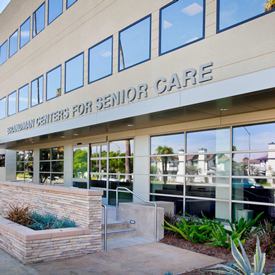
When It Comes to Serving Seniors, Los Angeles Jewish Health Keeps Up the PACE
Life expectancy in the United States is on the rise. As Americans live longer,
older adults are increasingly searching for ways to age in place—and to remain
in their own homes for as many years as they can. Enter the Brandman Centers for
Senior Care (BCSC), a Program of All-inclusive Care for the Elderly (PACE). Launched
by Los Angeles Jewish Health and generously funded by Joyce and Saul (of blessed
memory) Brandman, BCSC immediately distinguished itself as the San Fernando Valley's
first PACE program. Today they serve 320 senior participants, providing them
a one-stop shop for meeting their comprehensive health needs.
The Brandman Center's primary objective is to help seniors remain as independent
as possible, living safely in their homes and communities. It works to achieve this
goal through the provision of well-coordinated, highly-personalized, quality care,
with a broad range of services that promotes seniors' health and fills their days
with meaning and joy.
"Our offering truly is all-inclusive, covering everything from medical care,
specialty services, and rehabilitative care, to nutritional counseling, nursing
and preventive services, medications, medical supplies, and more," says Susie
Fishenfeld, BCSC executive director. "One of the best parts is that participants
never get a bill; as long as they use our providers, we handle everything."
With an interdisciplinary staff that includes a primary care physician; medical
specialists; a nurse; social worker; occupational, speech, and physical therapists;
personal care attendants; and a dietician, BCSC is open five days each week, year-round
(excluding holidays) from 8:30 am to 5 pm. Seniors become eligible when they are
age 55 or older, live in the BCSC service area, and have been deemed by the team
at BCSC and the California Department of Health Care Services to require nursing
home-level of care.
Unlike with regular health insurance, such as Medicare or MediCal, there is no
specific enrollment period for BCSC's PACE program; seniors can sign up at any time.
There are other key differences, as well.
"We provide more than just what people typically think of as 'healthcare,'
like doctor appointments and prescriptions," Susie notes. "So often, seniors
are just sitting home, watching TV all day; we actually get them out and bring them
to our center, where there are all kinds of wonderful activities for them. To see
how they thrive when they get here is really quite amazing."
Evelyn Frenkel, BCSC's director of marketing, agrees that, when it comes to BCSC,
seeing really is believing. "We just had a large holiday gathering, with music
and dancing," she says. "As people arrived, you could tell they were just
lighting up inside. It was wonderful."
Part of what makes BCSC so dynamic is its diversity. "We have so many languages
and cultures represented, and all religions," Susie says. "Forty percent
of our participants are Hispanic. And the diversity goes beyond background: Some
participants work; some drive. Everyone is at a different stage in life, yet they
all come together to create this beautiful community."
The census at BCSC, which continues to grow, is now the highest since the program
started in 2013—and talking to participants, it's easy to see why.
"I love all of the activities, I love the dancing and the music. I just
love it all," says Rose Robinett, who has been coming to BCSC since 2016.
One of BCSC's most ardent fans was William Kreiling, a devoted participant who
has since passed away. His expert summary of the prevailing sentiment about BCSC: "If
you look all over LA, you are not going to find a better organization than this
one."
Dec
7
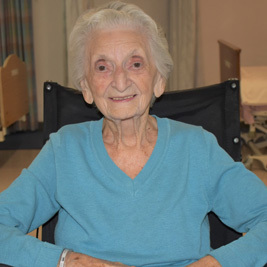
A Life of Resilience—An Inspiration for All
Katherina "Katy" Schaffer knows what it means to face extraordinary odds. But
she has also experienced, first-hand, the triumph of perseverance. Over the
course of her 97 years, Katy has faced unimaginable challenges, including time
spent in three Nazi concentration camps. Through them all, she has proven time
and again she has the strength of spirit to carry on—and, above all else, that
she is a true survivor.
A resident of Los Angeles Jewish Health's
Grancell Village for the past year, Katy's story starts in 1925, in pre-war
Czechoslovakia. One of six siblings, at the age of 19 she traveled to a
neighboring town to become an apprentice seamstress. As Europe fell under the
cloud of Nazi threat, her parents sent word that she should return home. On her
way back, at a train station in the company of her older sister, Katy was
abducted by the Germans. So began an odyssey that would subject her to the
unimaginable horrors of the Holocaust and leave her at death's door.
"When my mom was liberated, in 1945, she remembers airplanes dropping little
bags of cheese and bread. Some people she knew in the camps, who were on the
brink of starvation, ate so much that they died—their systems couldn't handle
all that sustenance at once," says Katy's daughter, Erit Siegal. "Fortunately,
she restrained herself, and she eventually made it to a hospital, where she
recuperated for a long time."
After she was liberated, Katy traveled to
her native Czechoslovakia, only to find that, aside from two sisters and a
brother, her entire family had perished in the Holocaust. She and her siblings
eventually emigrated to Israel, where she met her husband Otto and gave birth to
Erit. By then, one sister had moved again—this time, to Los Angeles—and Katy
and Otto decided to join her.
Katy and her family—which soon expanded
to include a son, George—thrived in Southern California. Otto worked in the
garment industry; Katy was a homemaker who cooked, sewed clothing, and provided
a warm and loving environment for her children in the house they purchased in
the San Fernando Valley in 1963. Despite the hardships she had endured, she
found fulfillment and success.
"I always tell people to learn from their
parents and neighbors, to follow Jewish values, to help the poor, and to be a
mensch," she says.
Husband Otto passed away in 2011; Katy stayed in
their home for another decade or so. Among the hobbies she took up during this
period was volunteering for seven years at Los Angeles Jewish Health (LAJH), in
the Arts and Crafts Room on the Eisenberg Village campus. "I've always felt
that, wherever I can help, I help," she says. "Giving back to LAJH was a way for
me to contribute."
Katy came to Los Angeles Jewish Health as a resident
via our short-term rehabilitation program after falling and fracturing her
spine. While in rehab, the vascular disease she had in her leg progressed,
ultimately resulting in the amputation of her leg. She moved into Los Angeles
Jewish Home full-time just over 12 months ago.
"Mom has always been
incredibly active, and losing her leg was so traumatic," Erit recalls. "But it's
kind of miraculous how she's adapted and adjusted. I think her experience in the
war contributed to her being able to deal with her current situation—these
survivors have something special in them that has enabled them to carry on."
Today, Katy keeps her mind and body active and agile through knitting,
doing word searches, and reading. Already during her brief tenure at LAJH, she
has developed a reputation for her trademark resilience and positive energy.
"Katy is an extraordinary person, and it's an honor to have her residing here at
Los Angeles Jewish Health," says Rabbi Karen Bender, LAJH's chief mission
officer. "She never allowed the atrocities she witnessed and experienced during
the Shoah to interfere with her ability to embrace life, and it's no wonder all
of the staff adore her. I personally love spending time with Katy. Her smile
inspires me!"
For her part, Katy is grateful for the blessings of family
and the benefits of living at Los Angeles Jewish Health. "My children and four
grandchildren keep me going," she says. "And I appreciate LAJH: I like the
kosher food, I've made friends with my roommate, and Dr. Marco and my nurses are
right here to help take care of me. I love it here—other places are just not
the same!"
Dec
7
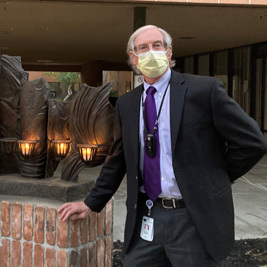
Celebrating the Wonder and the Miracle of Chanukah
To borrow from Adam
Sandler, "Chanukah is the Festival of Lights. Instead of one day of
presents, we have eight crazy nights". From those words of wisdom, we
get the questions to address. What is this Festival of Lights?
Why eight nights? In addition, while sufganiyot (jelly doughnuts) and
latkes (potato pancakes) are awesomely delicious, why are they associated
with Chanukah?
In the larger universe of Jewish holidays, Chanukah
is known to be a minor observance. It certainly is not a holiday or
observance on the level of Passover or Sukkot, let alone Rosh Hashanah.
Even as we know Chanukah is a minor festival, Chanukah is beloved and its
existence is widely known, if not understood. Here in America,
Chanukah gets extra exposure because of the proximity to the Christmas
holiday. Christmas is always December 25 but Chanukah follows the
Jewish-Lunar calendar and can occur as early as Thanksgiving or fall in the
later part of December. In that range of dates, Chanukah falls during
what is commonly called the Holiday Season and becomes incorporated into it.
That takes us to a uniquely American ideal about the make-up of our
nation. We inscribe on the coins of our currency E Pluribus Unum- or
in the English "Out of many one". In America, we celebrate being
united; additionally we treasure what makes each part of the American mosaic
unique. As the majority of Americans observe one holiday, Americans of
the Jewish faith observe Chanukah. At its core, Chanukah is the
celebration of maintaining that uniqueness. In the days following the
breakup of the empire of Alexander the Great, the dominant culture in the
Mediterranean world was the Greek culture. It would have been easy and
made their lives simpler for the Jews of those times to be swallowed by that
Greek culture. Yet, they refused, they rebelled against assimilation
and they elected to fight to maintain the faith and identity they inherited
from their ancestors. At the conclusion of this struggle to remain
unique in a larger culture, it was time to dedicate the great Temple in
Jerusalem. Part of the dedication or Chanukah was lighting the
menorah. On hand was only enough oil to last 1 day. It would
take several days for more oil to be procured. Rabbinic legend is that
the oil that should have lasted for 1 day actually lasted eight. For
that reason, we light candles in ascending numbers each night, to remember
this miracle of the oil lasting. In observing Chanukah, we celebrate
our unique identity in a larger world. Jews chose to retain the faith
of those who came before us and treasure that faith and uniqueness in a
diverse world.
Finally and very importantly, why the latkes and
sufganiyot? They are both linked to the miracle of the oil, as they
both are fried foods. When I was a student in Israel, I marveled
at the wide variety of sufganiyot-doughnuts on sale in every store and
bakery. Naturally, I had to sample a cross section. My favorite?
The chocolate frosted-halvah filled doughnut was the winner. Latkes
are potato pancakes of course. There are many different recipes for
them. You can use potatoes, sweet potatoes or even zucchini.
Among the many toppings can be applesauce, sugar or what I recommend, sour
cream. All are wonderful, all tasty without a doubt.
Nevertheless, what is valued is to pause, gather together to bless and light
the candles, sing the traditional songs and celebrate the wonder and miracle
of Jewish identity in our day and time.
Nov
1
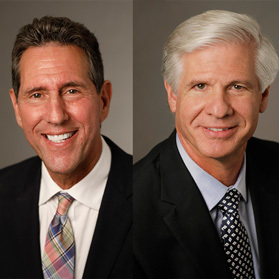
So Very Much to Be Grateful For This Season
Andrew Berman, Chair, and Dale Surowitz, President & CEO
As we enter the month of November, known for giving and giving thanks, we would like to take this
opportunity to reach out and share our heartfelt thanks and gratitude for all of
the support provided to the seniors of Los Angeles Jewish Health.
Once again,
your donations, coupled with the outstanding work of our Los Angeles Jewish
Health teams, meant our High Holidays were moving and meaningful for all who
participated. Our outstanding rabbinical leaders were joined by dozens of
additional staff from across departments including Dietary, Housekeeping,
Activities, Information Systems, Maintenance and many others, who came together
to produce special events and programming that resonated with all who
participated.
We are also grateful that, this year, we were able to open our
campuses to a modest number of family members to join with their loved ones in
person for services, even as we continued to follow all ongoing health
regulations still in place due to COVID-19. May next year bring even bigger
services, gatherings and celebrations!
For everyone who has supported the
work of Los Angeles Jewish Health this year, as we care for nearly 4,000 older
adults, nearly 80% of whom are at or near national poverty levels, you have our
collective thanks and deep appreciation. With the coming of Giving Tuesday on
November 29, and as you make your year-end gifts; please consider contributing
to Los Angeles Jewish Health.
As our senior population continues to grow
exponentially now and into the future, we are proud and privileged to be
available to serve them. Without your support, we could not provide these
outstanding services and programs or the award-winning care our seniors so
richly deserve.
Warmest regards and best wishes for the holiday season.
Andrew Berman
Dale Surowitz
Chair, Board of Directors
Chief Executive Officer & President